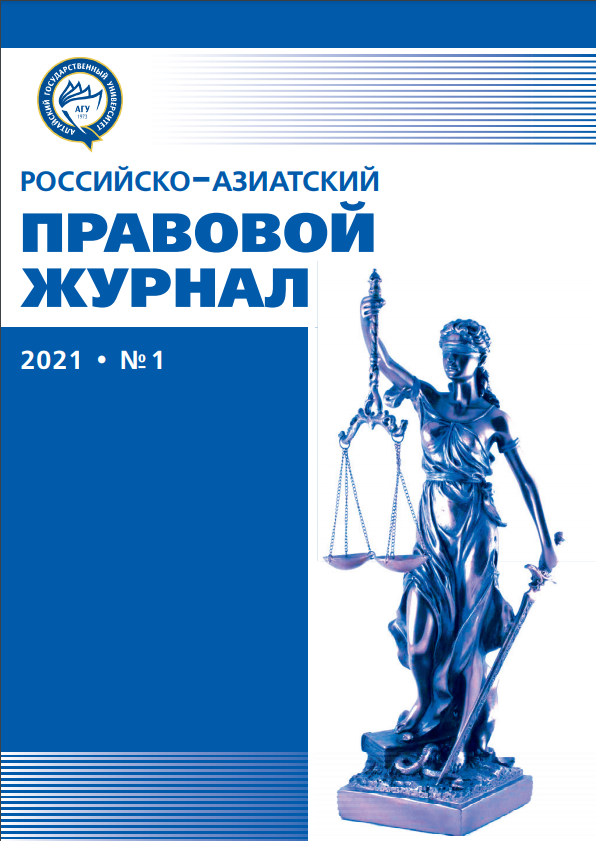ON THE NOTION AND THE ESSENSE OF FUNCTION OF THE CRIMINAL PROSECUTION IN THE CURRENT CRIMINAL PROCEEDINGS OF RUSSIA
УДК 343.1 ББК 67.410.2
Abstract
The article is devoted to the analysis of the issue of the concept and essence of the functions of criminalprosecution. According to author's opinion criminal prosecution in the modern criminal proceedings inRussia is carried out in the function of prosecution. Criminal prosecution is an activity stipulated by thecriminal procedure law for executive state body to carry out searching a person who has committed a crimefor the subsequent a fair sentence. The essence of criminal prosecution consists of the activities of state bodiesand officials aimed at establishing the circumstances to be proved in a criminal case as well as the adoptionof criminal procedural decisions in the course of this activity.
Downloads
References
2. Берова Д.М. Понятие и система функций в уголовном судопроизводстве // Общество и право. 2010. №. 4. С. 224–225.
3. Ильин С.И. Уголовное преследование в досудебном производстве : автореф. … дисс. канд. юрид. наук. М., 2007. С. 7.
4. Колодко В.В. Уголовно-процессуальная функция расследования : автореф. … дисс. канд. юрид.наук. Челябинск, 2013. С. 5–6.
5. Шишкина Е.В. Институт уголовного преследования : автореф. … канд. юрид. наук. Волгоград,2008. С. 6–7.
6. Ожегов С. И. Словарь русского языка: Ок. 57000 слов / под ред. докт. филол. наук, проф. Н.Ю. Шведовой. М. : Рус. яз., 1982. С. 217.
7. Мазюк Р.В. Уголовное преследование в российском уголовном судопроизводстве : автореф. …дисс. д-ра юрид. наук. М., 2012. С.
8. Королев Г.Н. Теоретические и правовые основы осуществления прокурором уголовного преследования в российском уголовном процессе : автореф. … дисс. д-ра юрид. наук. Н. Новгород, 2005.С. 34–35.
9. Васильев А.Н. Введение в курс советской криминалистики. М., 1962. С. 4.
10. О прокуратуре Российской Федерации : Федеральный закон Рос-сийской Федерации от 17.01.1992 №2202–1 // Собрание законодательства РФ. 1995. №47. ст. 4472.
11. Яковенко В.В. Уголовное преследование и роль прокурора в его осуществлении : автореф. …дисс. канд. юрид. наук. М., 2006. С. 10.
12. Кучин А.Ф. Правовой механизм публичного уголовного преследования : автореф. … дисс. канд. юрид. наук. Н. Новгород, 2004. С. 13–14.
13. Бабин К.А. Уголовное преследование как функция прокурора в уголовном процессе России : автореф. … дисс. канд. юрид. наук. Н. Новгород, 2008. С. 13.
14. Крюков В.Ф. Правовой статус прокурора в уголовном преследовании (досудебное и судебное производство) : автореф. … дисс. д-ра юрид. наук. М., 2012. С. 10.
15. Юлдошев Р.Р. Уголовное преследование в досудебном производ-стве по уголовно процессуальному законодательству Республики Таджикистан : автореф. … дисс. канд. юрид. наук. М., 2013. С. 14–15.
Russian-Asian Law Journal is a golden publisher, as we allow self-archiving, but most importantly we are fully transparent about your rights.
Authors may present and discuss their findings ahead of publication: at scientific conferences, on preprint servers, in public databases, and in blogs, wikis, tweets, and other informal communication channels.
Russian-Asian Law Journal allows authors to deposit manuscripts (currently under review or those for intended submission) in non-commercial, pre-print servers such as ArXiv.
Authors who publish with this journal agree to the following terms:
- Authors retain copyright and grant the journal right of first publication with the work simultaneously licensed under a Creative Commons Attribution License that allows others to share the work with an acknowledgement of the work's authorship and initial publication in this journal.
- Authors are able to enter into separate, additional contractual arrangements for the non-exclusive distribution of the journal's published version of the work (e.g., post it to an institutional repository or publish it in a book), with an acknowledgement of its initial publication in this journal.
- Authors are permitted and encouraged to post their work online (e.g., in institutional repositories or on their website) prior to and during the submission process, as it can lead to productive exchanges, as well as earlier and greater citation of published work (See The Effect of Open Access).








